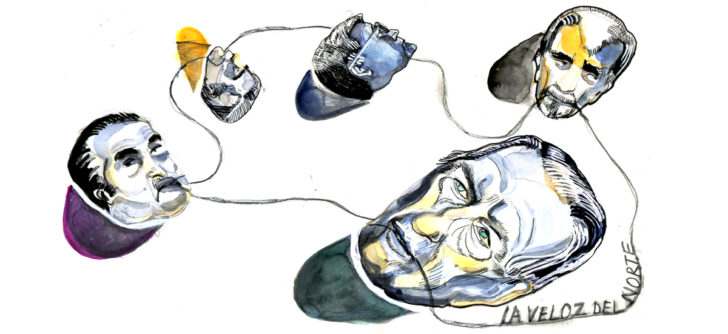The third panel of the Federal Chamber of Cassation in Criminal Matters overturned the crimes against humanity convictions of Marcos Levín and police officers Víctor Hugo Bocos, Víctor Hugo Almirón and Enrique Cardozo, who had been sentenced by a lower federal criminal court in Salta province in 2016. Levín, owner of the transportation company La Veloz del Norte, had been convicted as a necessary participant in the illegal deprivation of liberty and torture of Víctor Cobos.
Now, the Chamber judges – Eduardo Riggi, Juan Carlos Gemignani and Carlos Mahiques – decided that the offenses committed are not crimes against humanity and that the detention and torture suffered by trade-union delegate Víctor Cobos were unrelated to the context of systematic repression of political opponents and organized workers. Instead, they understood that Cobos’ detention was related to a legal complaint by Levín regarding a financial issue, i.e. a private matter that had nothing to do with the political context. Unlike the lower court, the Chamber did not take into account that the civilian-military dictatorship’s repressive methodology included the fabrication or simulation of criminal cases to provide a veneer of legality to illegal procedures carried out in the framework of the “fight against subversion.”
Marcos Levín was the owner of La Veloz del Norte in the 1970s. Union conflicts at that time often ended in the signing of agreements at the Labor Ministry, which the company would infringe, prompting workers to take action. After the coup d’état of March 1976, at least 22 workers at La Veloz were victims of crimes against humanity. In January 1977, they were accused of an alleged swindle, detained and tortured at the fourth police station in Salta. A group was transferred from the police station to the prison of Villa Las Rosas. The repression they experienced is closely linked to the objective of deactivating labor demands. In January 1977, Víctor Cobos, a driver for La Veloz and union representative, was threatened by Levín, who boarded the bus that Cobos was driving with two policemen. Cobos was used to threats from Levín; during a general transportation strike, he had already been attacked. The day after this encounter, Cobos was detained based on a fabricated complaint alleging that he had sold bus tickets without issuing receipts. He was then tortured for several days by the policemen who had accompanied Levín.
The judicial case to determine liability for the crimes against humanity committed against the workers of La Veloz del Norte began in 2011 with Cobos’ testimony. During the trial, some of the witnesses mentioned the existence of a list of employees linked to the union who should be detained, which had been prepared by the company’s head of personnel. A senior worker recalled that the list was given to Levín so he could “tell the police commissioner what he had to do.”
The judges at the Chamber chose to ignore civilian and corporate complicity with the dictatorship, sustaining that since Levín was a civilian, he was external to the police station and had no control over what occurred. Nor did they consider it had been proven that Levín intervened directly in any of the crimes he was charged with since they questioned the numerous witnesses who told of Levín’s presence at the place of torture and of the instructions he reportedly gave to the people applying the electric prod. The Chamber considered these testimonies to be irrelevant because they were provided by people “close” to the victim.
The Chamber’s decision disregarded the context of worker persecution that existed at that time and was evident in the case of La Veloz del Norte. It did not bother to analyze the articulation between military interests and those of business leaders, or the active role that companies played in the repression of their workers. This decision fails to acknowledge the context of dictatorship, in which there were clandestine detention centers inside manufacturing plants, military operations on company premises, private resources supplied for the repression, and workers singled out for kidnapping. By scrapping this analysis, the Chamber ignored descriptions by the lower court regarding how Levín had taken advantage of that context to fabricate a criminal case without any proof in order to destroy union activity at his company.
The lower court decision, which is now revoked, represented the first conviction in Argentina of a businessman for crimes against humanity committed against his workers under state terrorism. The ruling that revokes it, based on arbitrary arguments and regressive developments in our country’s jurisprudence on crimes against humanity, reveals the intention of retracing the steps taken over the last four decades to reconstruct events and contribute to a truth that includes civilian sectors and that, in recent years, has had a judicial impact as new investigations opened the way to sanctioning the guilty. This Chamber’s decision reflects the recalcitrant position held by a sector of the judicial branch vis-à-vis progress on investigating economic actors who were part of the dictatorship’s systematic plan for extermination. The complicated web woven under state terrorism requires denouncing, investigating and sanctioning the full range of civilian responsibilities, including members of the judicial branch, the Catholic Church and the business sector.
*Image: Azul Blaseotto

